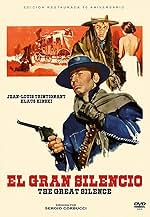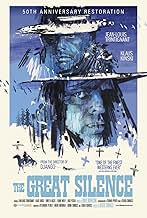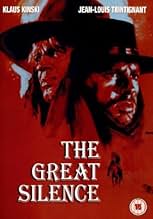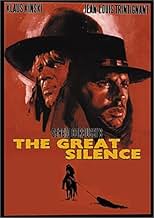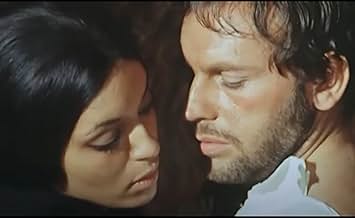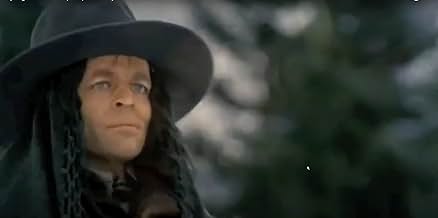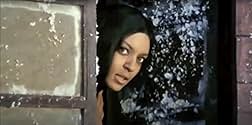IMDb रेटिंग
7.7/10
19 हज़ार
आपकी रेटिंग
अपनी भाषा में प्लॉट जोड़ेंA mute gunman helps townspeople fight corrupt and tyrannical authorities.A mute gunman helps townspeople fight corrupt and tyrannical authorities.A mute gunman helps townspeople fight corrupt and tyrannical authorities.
- पुरस्कार
- कुल 1 जीत
Jean-Louis Trintignant
- Silenzio
- (as Jean Louis Trintignant)
Vonetta McGee
- Pauline Middleton
- (as Vonetta Mc Gee)
Carlo D'Angelo
- Governor of Utah
- (as Carlo D' Angelo)
Fortunato Arena
- Outlaw
- (बिना क्रेडिट के)
Giulio Baraghini
- Man in Saloon
- (बिना क्रेडिट के)
Gino Barbacane
- Poker Player
- (बिना क्रेडिट के)
Lino Coletta
- Hunter
- (बिना क्रेडिट के)
फ़ीचर्ड समीक्षाएं
Sergio Corbucci swaps the desert for snowy mountains, howling coyotes for howling wind, and supplies a strong silent hero so silent that he doesn't speak at all. Ennio Morricone changes tone completely and gives us a morose, sad soundtrack that perfectly matches the atmosphere of desperation that flows through the entire film. No doubt about it – this film leaves a mark.
In the mountains of Utah, starving citizens of the town of Snow Hill are forced to steal to feed themselves, and in turn have to hide in the mountains with a price on their head. The corrupt banker and Justice of the Peace Pollicut (Luigi Pistilli), encourages bounty hunters to hunt them down, as he makes a percentage on every 'bandit' brought in. However, the persecuted folks have help in the form of Silence, who really, really hates bounty hunters – and with good reason. Silence will only fire upon someone if they draw first, and he also likes to shoot the thumbs off bounty hunters, as Pollicut knows too well.
Worst of all the bounty hunters is Loco (Klaus Kinski), who doesn't even care why people have a price on their heads, as long as he gets the money, and there's no 'dead or alive' where Loco is concerned. If they're dead, he doesn't have to feed them. Loco kills the husband of Pauline, who returned from exile to visit his wife, and she hires Silence to kill him. Loco knows that Silence is too fast for him, and will not be drawn into a gunfight yet.
There's also a new Sheriff in town that quickly twigs that things aren't quite right in Snow Hill. Burnett (Wolff, playing the only character approaching 'comic relief'), does not agree at all with Pollicut and Loco's tactics, even going so far as to arrest Loco and take him elsewhere for a trial.
That's enough plot! There's loads going on in this film, and plenty of it must have been quite daring for 1968. The interracial sex scene between Silence and Pauline for starters (and the music during this bit is outstanding, even for Morricone!), the bloody violence with headshots being a speciality, and the ending! The ending! Jesus! Buddha! Brian Blessed! The ending! Indy! The ending! I will not reveal it here, but it's certainly not something you encounter very often, in any genre. Jaw-dropping.
The acting is also faultless too, even if it is dubbed. Klaus Kinski is very restrained for the most part, but still comes across as a polite, malicious, sadistic murderer who is also smarter than everyone else. This might possibly be the best film I've seen him in. Luigi Pistilli isn't too far behind either. He's cowardly and scheming and likes to make others do his dirty work (mainly Mario Brega, who meets a gory end that stands out). Frank Wolff jumps between comedic and serious as the only male character in possession of a soul. His character follows the law to the letter, which may be a mistake in the hostile environment of Snow Hill. I'm not familiar with the actress that plays Pauline but she also stands out as a woman channelling her grief into one simple task – to kill Loco.
This one gets the highest recommendation for me!
In the mountains of Utah, starving citizens of the town of Snow Hill are forced to steal to feed themselves, and in turn have to hide in the mountains with a price on their head. The corrupt banker and Justice of the Peace Pollicut (Luigi Pistilli), encourages bounty hunters to hunt them down, as he makes a percentage on every 'bandit' brought in. However, the persecuted folks have help in the form of Silence, who really, really hates bounty hunters – and with good reason. Silence will only fire upon someone if they draw first, and he also likes to shoot the thumbs off bounty hunters, as Pollicut knows too well.
Worst of all the bounty hunters is Loco (Klaus Kinski), who doesn't even care why people have a price on their heads, as long as he gets the money, and there's no 'dead or alive' where Loco is concerned. If they're dead, he doesn't have to feed them. Loco kills the husband of Pauline, who returned from exile to visit his wife, and she hires Silence to kill him. Loco knows that Silence is too fast for him, and will not be drawn into a gunfight yet.
There's also a new Sheriff in town that quickly twigs that things aren't quite right in Snow Hill. Burnett (Wolff, playing the only character approaching 'comic relief'), does not agree at all with Pollicut and Loco's tactics, even going so far as to arrest Loco and take him elsewhere for a trial.
That's enough plot! There's loads going on in this film, and plenty of it must have been quite daring for 1968. The interracial sex scene between Silence and Pauline for starters (and the music during this bit is outstanding, even for Morricone!), the bloody violence with headshots being a speciality, and the ending! The ending! Jesus! Buddha! Brian Blessed! The ending! Indy! The ending! I will not reveal it here, but it's certainly not something you encounter very often, in any genre. Jaw-dropping.
The acting is also faultless too, even if it is dubbed. Klaus Kinski is very restrained for the most part, but still comes across as a polite, malicious, sadistic murderer who is also smarter than everyone else. This might possibly be the best film I've seen him in. Luigi Pistilli isn't too far behind either. He's cowardly and scheming and likes to make others do his dirty work (mainly Mario Brega, who meets a gory end that stands out). Frank Wolff jumps between comedic and serious as the only male character in possession of a soul. His character follows the law to the letter, which may be a mistake in the hostile environment of Snow Hill. I'm not familiar with the actress that plays Pauline but she also stands out as a woman channelling her grief into one simple task – to kill Loco.
This one gets the highest recommendation for me!
"That western in the snow" - was my brother's response when he heard that I'd finally tracked down a copy of THE GREAT SILENCE, a.k.a. THE BIG SILENCE (I first saw it 10 years ago on BBC2's 'Moviedrome').
If you like Sergio Leone's films (such as THE GOOD THE BAD AND THE UGLY and A FISTFUL OF DOLLARS) then you'll probably enjoy this film by Sergio Corbucci. Violence, shooting, cussing, strange costumes, haunting music, trademark camera angles and the Italian style go to make up one of the best (lost)westerns I've ever seen.
These films aren't to everyone's taste, but THE GREAT SILENCE is worth watching just to hear the main theme tune which is a fantastic work of latterday composition - it sounds daft but I nearly cry when I hear it sometimes. By turns the score is dream-like, stylish, menacing, bizarre and even ridiculous (twanging sitar-like sounds). This is my favourite piece of Ennio Morricone's music.
As I said before the main reference points for this film are those of Sergio Leone, except for the snow-laden setting and the distinct lack of humour( THE GOOD THE BAD AND THE UGLY still makes me laugh, despite countless watching). Having said that this film has a distinctly original atmosphere of it's own, brought out in the brilliant and shocking ending. the director went to great lengths to preserve his radical finale (particularly unpopular with the producer) - there is a version of the film with a cop-out ending.
In short then, this is a great movie despite all the shortcomings of the particular genre( I'm not saying anything)- I once read that the term "Spaghetti Western" was a derisory one used by American film critics - but I can't think of any American westerns as enjoyable as some of these Italian films.
If you like Sergio Leone's films (such as THE GOOD THE BAD AND THE UGLY and A FISTFUL OF DOLLARS) then you'll probably enjoy this film by Sergio Corbucci. Violence, shooting, cussing, strange costumes, haunting music, trademark camera angles and the Italian style go to make up one of the best (lost)westerns I've ever seen.
These films aren't to everyone's taste, but THE GREAT SILENCE is worth watching just to hear the main theme tune which is a fantastic work of latterday composition - it sounds daft but I nearly cry when I hear it sometimes. By turns the score is dream-like, stylish, menacing, bizarre and even ridiculous (twanging sitar-like sounds). This is my favourite piece of Ennio Morricone's music.
As I said before the main reference points for this film are those of Sergio Leone, except for the snow-laden setting and the distinct lack of humour( THE GOOD THE BAD AND THE UGLY still makes me laugh, despite countless watching). Having said that this film has a distinctly original atmosphere of it's own, brought out in the brilliant and shocking ending. the director went to great lengths to preserve his radical finale (particularly unpopular with the producer) - there is a version of the film with a cop-out ending.
In short then, this is a great movie despite all the shortcomings of the particular genre( I'm not saying anything)- I once read that the term "Spaghetti Western" was a derisory one used by American film critics - but I can't think of any American westerns as enjoyable as some of these Italian films.
This French- Italian co-production is a Spaghetti Western masterpiece by Sergio Corbucci , being highly rated by the critics and is one of his best movies, along with ¨the Compañeros¨ and ¨Djanjo¨. It takes place in the snow-filled outdoors of Utah and based on real events during the great Blizzard of 1885 and shot in Cortina D'Ampezzo in the Dolomitas mountains located in the Alps . The film is plenty of dark fatalism and features to Silence (Jean Louis Trintignant in his first and unique Western , he had agreed to do the film in order to help out the producer, who was a friend of his), a mute gunslinger with a 7,63 mm Mauser Broomhandle gun , helping a group of desperado outlaws and an African- American woman named Pauline (Voneta McGee) attempting to revenge death her husband against the bounty hunters led by the ruthless Loco (Klaus Kinski) and payed by Pollicut (Luigi Pistilli) . Furthermore, an upright sheriff (Frank Wolff) appears trying peace and order.
This widely deemed picture , unlike most conventional Spaghetti Western , contains exceptional setting , colorful images with a sensational cinematography by Silvano Ippoliti and features a sensitive musical score by the classic Ennio Morricone . This splendid Western results to be a remake to Japanese Samurai TV series starring Shintarô Katsu (1973) . Jean-Louis Trintignant agreed to play in a spaghetti western under the condition that he did not have to learn any lines for the role , that's why the main character conveniently became a mute in the story. Nice production design and the snow in the town of Snow Hill was created by gallons of shaving cream . The movie was widely inspired by ¨Day of outlaw¨ (Andre de Toth with Robert Ryan , 1959) and set in 1898 in a small town called Snow Hill where is developed a massacre . The motion picture was originally directed by Corbucci and displays a twisted finale with dark surprise included . As trivia, explaining that Trintignant didn't know English , language used during filming , and Marcello Mastroiani, Sergio Corbucci's friend , suggested him playing a mute gunfighter named Silence , resulting to be the film title . Rating : Better than average . Indispensable and essential seeing for SW lovers.
This widely deemed picture , unlike most conventional Spaghetti Western , contains exceptional setting , colorful images with a sensational cinematography by Silvano Ippoliti and features a sensitive musical score by the classic Ennio Morricone . This splendid Western results to be a remake to Japanese Samurai TV series starring Shintarô Katsu (1973) . Jean-Louis Trintignant agreed to play in a spaghetti western under the condition that he did not have to learn any lines for the role , that's why the main character conveniently became a mute in the story. Nice production design and the snow in the town of Snow Hill was created by gallons of shaving cream . The movie was widely inspired by ¨Day of outlaw¨ (Andre de Toth with Robert Ryan , 1959) and set in 1898 in a small town called Snow Hill where is developed a massacre . The motion picture was originally directed by Corbucci and displays a twisted finale with dark surprise included . As trivia, explaining that Trintignant didn't know English , language used during filming , and Marcello Mastroiani, Sergio Corbucci's friend , suggested him playing a mute gunfighter named Silence , resulting to be the film title . Rating : Better than average . Indispensable and essential seeing for SW lovers.
Klaus Kinski, an actor famed for his eccentricities and Werner Herzog collaborations, which occurred throughout the '70s and '80s. He is the lingering, temperamental and key constituent for the obscure 1968 gem, The Great Silence. Arguably, the work is partially responsible (or is rather the "finishing note") to the end of the '60s, Italian sub-genre named the "spaghetti western." This is a loose term, regularly associated with the works of Sergio Leone and few erstwhile, Italian directors who approached the spin-off genre of the stereotypical, American western. The Italian westerns emerged within the mainstream, during the midway of the '60s, becoming recognised for the close resemblance they all had with each other. The ostensible sped-up zooms, jarring scores and unforgiving violence marked the genre as the most rebellious and hard-boiled of its time. The Great Silence further proves this perceived notion.
Director Sergio Corbucci (known for his hyper-violent, but somewhat communitarian motifs) incorporates both American and European cinema values, as well as the themes generally condoned along with the western genre. Telling the tale of a ruthless bounty-hunter ironically named Loco, (played by Klaus Kinski, always fitting the mould of a maniac) who wanders the snow-ridden state of Utah in search of "wanted: dead or alive" criminals. Essentially, he is a villain, a despicable individual who makes a living out of money for murder. Gaining $1000 for each heinous slaughter he commits, Loco one day kills the husband of Pauline (a woman who refuses to accept the murder) and racially abuses her after doing so. It is from this crime that the film promptly escapades into a jaunting exercise of revenge on behalf of two individuals (firstly Pauline and then the "opposed-to-bounty-hunting" gunslinger she so vehemently hires).
Filmed in strikingly intrepid weather conditions and motivated by cold-hearted brutality, The Great Silence captures a landscape which is a parallel to the themes portrayed within the piece. First-rate direction is garnered from the messy, cut-throat editing and the resounding cynical tone of a dead-beat anti-western will leave fans groping for more of its kind. For such a tough film, it will be evident that the innocent characters do not beg of sympathy, but are able to warrant a valuable empathy through the -although often questionable- acting. Pauline, a key character in the story utters "once, my husband told me of this man. He avenges our wrongs. And the bounty killers sure do tremble when he appears. They call him "Silence." Because wherever he goes, the silence of death follows." She makes this heroic statement after she swears to seek vengeance for her murdered husband, and it is unquestionably the film's finest moment. Nevertheless, the film's most triumphant highlight is Klaus Kinski, who defies the bounty-hunter archetype by using a patronising and hollow method of acting. It could have been the recipe for disaster, but Klaus Kinski pitches the ambiance of his role admirably.
Requiring a certain amount of respect for the genre, The Great Silence works as a fine ode to a time when cinema was full of defiant gusto. Although not for everyone, the film is a pleasant surprise for viewers who are interested in genre cinema or in search of films from a forgotten era. Just remember that by no means is it a Leone rip-off.
Director Sergio Corbucci (known for his hyper-violent, but somewhat communitarian motifs) incorporates both American and European cinema values, as well as the themes generally condoned along with the western genre. Telling the tale of a ruthless bounty-hunter ironically named Loco, (played by Klaus Kinski, always fitting the mould of a maniac) who wanders the snow-ridden state of Utah in search of "wanted: dead or alive" criminals. Essentially, he is a villain, a despicable individual who makes a living out of money for murder. Gaining $1000 for each heinous slaughter he commits, Loco one day kills the husband of Pauline (a woman who refuses to accept the murder) and racially abuses her after doing so. It is from this crime that the film promptly escapades into a jaunting exercise of revenge on behalf of two individuals (firstly Pauline and then the "opposed-to-bounty-hunting" gunslinger she so vehemently hires).
Filmed in strikingly intrepid weather conditions and motivated by cold-hearted brutality, The Great Silence captures a landscape which is a parallel to the themes portrayed within the piece. First-rate direction is garnered from the messy, cut-throat editing and the resounding cynical tone of a dead-beat anti-western will leave fans groping for more of its kind. For such a tough film, it will be evident that the innocent characters do not beg of sympathy, but are able to warrant a valuable empathy through the -although often questionable- acting. Pauline, a key character in the story utters "once, my husband told me of this man. He avenges our wrongs. And the bounty killers sure do tremble when he appears. They call him "Silence." Because wherever he goes, the silence of death follows." She makes this heroic statement after she swears to seek vengeance for her murdered husband, and it is unquestionably the film's finest moment. Nevertheless, the film's most triumphant highlight is Klaus Kinski, who defies the bounty-hunter archetype by using a patronising and hollow method of acting. It could have been the recipe for disaster, but Klaus Kinski pitches the ambiance of his role admirably.
Requiring a certain amount of respect for the genre, The Great Silence works as a fine ode to a time when cinema was full of defiant gusto. Although not for everyone, the film is a pleasant surprise for viewers who are interested in genre cinema or in search of films from a forgotten era. Just remember that by no means is it a Leone rip-off.
This is among the very few films that make you truly disgusted by its violence; not because of the amount of blood as in many other films but because the victims of the bounty hunters are human beings, slaughtered brutally in front of their own family members. Corbucci has disguised this film as a piece of popular cinema, but gives us shocks once in a while, and finally surprises us completely in the unexpected end. This is how he makes his anti-violent message very clear, and it is easy to agree with him.
IL GRANDE SILENZIO is more pessimistic but also more human than any western by Leone or Peckinpah. It may not be a pleasant experience, but if you want to see a masterpiece of cinema instead of a traditional western, it is definitely worth waiting in line for.
IL GRANDE SILENZIO is more pessimistic but also more human than any western by Leone or Peckinpah. It may not be a pleasant experience, but if you want to see a masterpiece of cinema instead of a traditional western, it is definitely worth waiting in line for.
क्या आपको पता है
- ट्रिवियाAccording to Sergio Corbucci, Marcello Mastroianni gave him the idea of a mute gunfighter when the actor told him that he had always wanted to do a Western, but unfortunately didn't speak English. When Corbucci first met Jean-Louis Trintignant, he learned that he didn't speak English either. Because he had a fascination with characters with a crippling weakness, Corbucci decided that this was the moment to turn the taciturn Spaghetti Western hero into a mute.
- गूफ़On the map in the governor's office, the state of Nevada is identified as Utah.
- भाव
[English subtitled version]
Pauline Middleton: Once, my husband told me of this man. He avenges our wrongs. And the bounty killers sure do tremble when he appears. They call him "Silence." Because wherever he goes, the silence of death follows.
- इसके अलावा अन्य वर्जनTwo alternative endings were created for this film:
- A "happy" ending, in which Sheriff Burnett (having somehow survived being trapped under a frozen lake) rides into town and shoots Loco before he can kill Silence, allowing him to kill the remaining bounty killers. This ending was once believed to be shot for the North African and Japanese markets, but has since been revealed to have been created as an alternative solution for the producers, who wanted the film to have a "seasonal" (ie. Christmas) appeal.
- A lesser-known, "ambiguous" re-cut of the original ending with additional footage, in which Silence is wounded, but Loco gestures to his gang members to leave the saloon before they can kill anyone.
- कनेक्शनFeatured in Western, Italian Style (1968)
टॉप पसंद
रेटिंग देने के लिए साइन-इन करें और वैयक्तिकृत सुझावों के लिए वॉचलिस्ट करें
- How long is The Great Silence?Alexa द्वारा संचालित
विवरण
बॉक्स ऑफ़िस
- US और कनाडा में सकल
- $53,074
- US और कनाडा में पहले सप्ताह में कुल कमाई
- $8,755
- 1 अप्रैल 2018
- दुनिया भर में सकल
- $60,500
- चलने की अवधि1 घंटा 45 मिनट
इस पेज में योगदान दें
किसी बदलाव का सुझाव दें या अनुपलब्ध कॉन्टेंट जोड़ें


